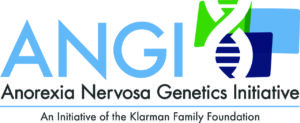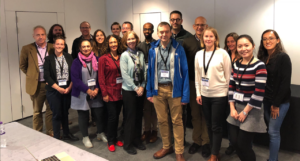Researchers identify first genes linked to anorexia nervosa

Researchers identify first genes linked to anorexia nervosa
I feel deeply emotional about this week’s announcement on genetic discovery. For a start, contributing a DNA sample to this ground-breaking research led by Professor Cynthia Bulik has helped me and thousands of others to feel that our lives and illness experience count. We want to ease suffering of others. Participating in this research helps us all.
DNA samples gathered from 17,000 people worldwide have helped scientists to identify the first eight genetic loci associated with the eating disorder, anorexia nervosa.
The international study reveals that the origins of anorexia nervosa appear to be both metabolic and psychiatric.
The results of the large-scale genome-wide association study have been published this week in the prestigious journal Nature Genetics.
Anorexia nervosa is a life-impairing illness characterised by dangerously low body weight, an intense aversion to gaining weight, and an inability or unwillingness to recognise the seriousness of the low body weight.
Researchers from QIMR Berghofer, Australia, have played a vital role in the project, recruiting nearly 3000 Australians and New Zealanders with lived experience of the debilitating eating disorder to contribute DNA for the study of 16,992 anorexia cases* from around the world.
The genetic information of people with lived experiences of the disorder was compared to DNA from 55,525 controls of European ancestry from 17 countries across North America, Europe, and Australasia.
A huge step forward and more to come
QIMR Berghofer senior scientist and head of the Institute’s Genetic Epidemiology laboratory, Professor Nicholas Martin, said the findings represented a huge step forward in understanding the disorder.
“We’ve got the first eight loci, but we know there are hundreds more genes to find, and we can only do that by broadening the study and recruiting more participants. I am hoping that this success will encourage other Australians living with eating disorders to volunteer to help us find the responsible genes,” Professor Martin said.
“By showing the role genetics plays in anorexia nervosa we should be able to remove any remaining stigma associated with the condition for patients and their families – especially parents.
“Australians and New Zealanders provided a fifth of the information needed to confirm the genetic basis of this potentially life threatening condition and I want us to continue to play a big role in expanding our knowledge of eating disorders.
“Our goal is to recruit 100,000 anorexia nervosa cases internationally with appropriate controls, and to also broaden our search beyond anorexia nervosa to include other eating disorders such as bulimia nervosa and binge eating disorder.”
Thinness – shining the torch on the role of metabolism
Principal investigator and Professor at the University of North Carolina School of Medicine in the United States and Karolinska Institutet in Sweden, Cynthia M. Bulik, said establishing the role metabolism played in anorexia nervosa would influence treatment.
“Until now, our focus has been on the psychological aspects of anorexia nervosa such as the patients’ drive for thinness. Our findings strongly encourage us to also shine the torch on the role of metabolism to help understand why individuals with anorexia frequently drop back to dangerously low weights, even after therapeutic renourishment,” Professor Bulik said.
“A failure to consider the role of metabolism may have contributed to the poor track record among health professionals in treating this illness.”
Overlapping with other psychiatric disorders
Coordinator of QIMR Berghofer’s mental health program, Professor Sarah Medland, said the wide ranging research also uncovered other important information on the illness.
“The study found the genetic basis of anorexia nervosa overlapped with other psychiatric
disorders such as obsessive-compulsive disorder, depression, anxiety, and schizophrenia, and this underscores the importance of taking a broad clinical focus in working with individuals who experience an eating disorder,” Professor Medland said.
The study also found the genetic basis of anorexia nervosa overlapped with metabolic (including glycemic), lipid (fats), and anthropometric (body measurement) traits, and that was not due to genetic effects that influence BMI.
A saliva sample is all it takes to donate to the next research stage – and people with lived experience of bulimia nervosa and binge eating disorder can take part too
In Australia, people who have lived with anorexia nervosa, bulimia or other eating disorders are encouraged to sign up to the next stage of the study and provide a saliva sample from which DNA can be extracted.
For the first stage in the research, participants needed to provide blood samples, but technology advancements mean that for this next stage, a saliva sample is all that is needed. Easy!
Australians who are interested in taking part in the study should visit the website: edgi.qimr.edu.au, or phone the toll-free number 1800 257 179.

Professor Bulik answers more questions for you
What about elsewhere in the world?
This will evolve over time. Right now, Professor Nick Martin has a jump on things. We are hoping to start out with US, Australia, NZ, Sweden, UK, but then hope to add countries as we go along. We are also opening up to other eating disorders which is why the name will be changed to EDGI “Eating Disorders Genetics Initiative”.
What type of eating disorder illness can research donors have?
Donors can have anorexia nervosa, bulimia nervosa, or binge-eating disorder (we don’t have permission for ARFID or what is currently known as “atypical anorexia nervosa” yet, but they will be next!).
How do you feel about the research findings so far?
Six years ago, I was feeling both daunted and determined. I knew in my heart that we could create a research community by uniting people with lived experience, families, clinicians, advocates, and researchers to reach our ambitious goal of 13,000 cases. I think my confidence came from having worked clinically with this group of people for so many years and knowing that they were desperate for answers and that their compassion would help them recognize that participation in the study was a way to give back.
Even though this work does not lead to an immediate new treatment, it does provide a new explanatory framework for the illness. Whenever something goes wrong with us, we try to develop a narrative to explain it. This work—especially identifying that there is both a psychiatric and a metabolic component to the illness—puts us on the path to solving some mysteries about anorexia nervosa that we simply do not understand.
What are you learning about weight and thinness?
On a basic level, we really do not understand how individuals prone to anorexia nervosa can actually lose so much weight. We also don’t understand why they so frequently lose weight again, even after renourishment.
Yes, the drive for thinness is like a freight train, but there had to be more to it than just the power of will or the fear of weight gain. Knowing that there is a metabolic component can help us understand these aspects of the illness and why it may be so hard to recover. It may also underscore how important complete renourishment and weight stabilization is (be that through FBT or inpatient renourishment) in order to give the metabolism an opportunity to equilibrate at a new healthy weight.
It is so easy for the weight loss process to kick back in when someone with a history of AN finds themselves in negative energy balance (consuming less energy than they are expending), and this gives us even more confidence in saying that people with a history of AN, even if recovered for a long time, should avoid negative energy balance at all costs. It is just too much of a risk.
What are your hopes and your dreams for this research? How might the findings influence the treatment of eating disorders?
Even though this was a huge effort, we know how to do it now, and it has become easier with just needing saliva samples! We know what we have to do and where we have to go.
As our sample size increases, the results that we see will become more robust and begin to identify biological pathways that help us understand these illnesses more. Then we can engage our physiologist, neuroscientist, and pharmacogeneticist friends to really start delving into the biology to figure out how metabolism is implicated and potentially (hopefully) developing or repurposing medications that can assist with treating the illness.
We have woefully few tools at our disposal to treat this illness, and one of my dreams is to change the treatment landscape—both by developing new medications but even more importantly by personalizing treatment based on genetic profiles.
We may find that there is more than one type of AN—possibly a more psychological type and a more metabolic type and the optimal way to treat them may differ. Also, right now, we have no way of predicting, when that young person walks into our office with the first signs of AN, whether they are at risk for developing a chronic course, whether they are at risk for developing BN, whether they are at risk for osteoporosis (for example). My hopes and dreams for this work is that we will be able to predict risk for these outcomes better when our genetic data augments our clinical histories.
What is the key finding so far?
The key finding rests in the title and that is that our findings are encouraging us to consider anorexia nervosa to be a metabo-psychiatric disorder. We need to consider both components when we conceptualize the illness and when we treat the illness.
Another thing that I think is really interesting in this research is that we can see positive genetic correlation with physical activity. We all know that at least a subset of individuals with anorexia nervosa has high physical activity and that many people with AN will continue to be driven to exercise or just move a lot even when severely ill and underweight. It is a very difficult symptom to control and to treat and can complicate recovery.
In the past we have had various theories to explain the high physical activity: mostly psychological explanations focusing on the drive to lose weight, but some biological like to warm a body that is at low temperature. But this result shows a positive genetic correlation between AN and accelerometer-measured physical activity (from a large GWAS in the UK Biobank)—meaning that some of the same genes that influence AN also influence risk for high physical activity levels. So, a genetic predisposition to high physical activity may be one of the reasons that this symptom exists and is so difficult to bring under control.
So how important are our genes in research?
I think we (you and I and everyone) need to be super clear that genes are not destiny! Even though genetics clearly play a role, they do not destine one to have AN or to pass AN on to the next generation!
Since we get our genetic material from both of our parents, we inherit both risk and buffering genes and throughout our lives we are exposed to both risk and buffering environmental effects as well. We are living in the land of probabilities.
We are very keen to address this and have started working toward engaging genetic counselors in the field of eating disorders to help people with the illness understand the probabilities and assist them in developing appropriate vigilance for symptoms in their children.
It always helps us to know our family history of both physical and mental illnesses. That family history checklist you fill out when you go to the GPs office SHOULD include anorexia nervosa, bulimia nervosa, and binge-eating disorder as well. Most GPs now include depression on those family history checklists, but we need a concerted effort to get eating disorders included too.
What can parents do today?
Parents with histories of eating disorders are struggling to figure out what the appropriate level of vigilance is as they watch their children traverse the ages of risk for eating disorders and I think this is a very important area in which we need more research. We are aiming for a gentle balance between being hypervigilant and blind to emerging signs. There are some folks doing good work in this area and we need to keep developing it to help our patients and their partners as they traverse the reproductive years.
The international research was funded by the Boston-based Klarman Family Foundation, the Australian National Health and Medical Research Council, the U.S. National Institute of
Mental Health, the UK National Institute for Health Research, and the Foundation of Hope, Raleigh, NC.
*The data were collected by the Anorexia Nervosa Genetics Initiative (ANGI) and the Eating Disorders Working Group of the Psychiatric Genomics Consortium







